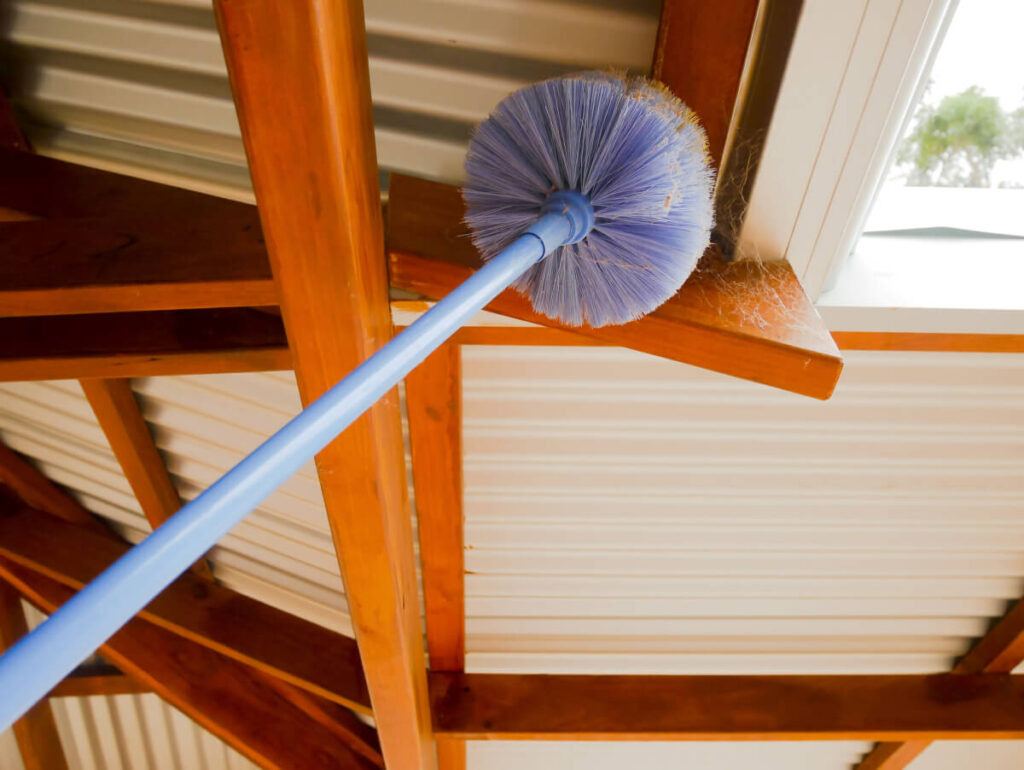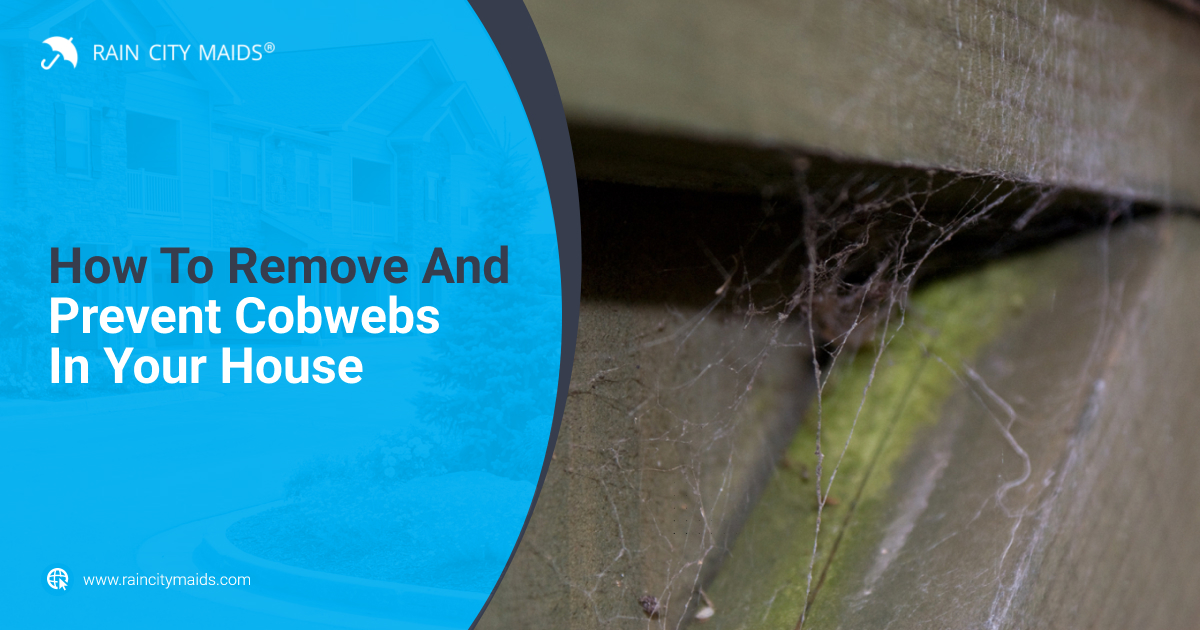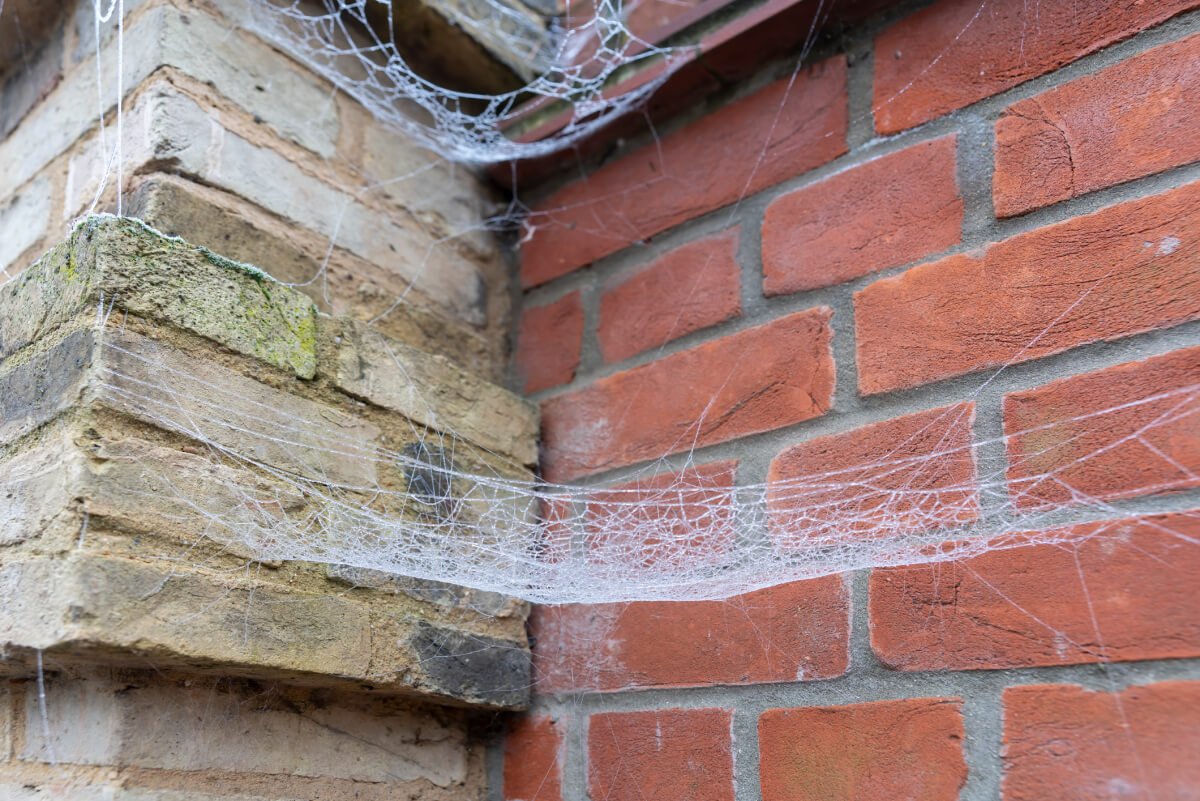To avoid spider webs in the house, regularly clean corners and use peppermint oil. Sealing cracks also prevents spiders from entering.
Dealing with spider webs in your home can be a nuisance, yet it’s a common challenge many homeowners face. Spiders often seek shelter in our living spaces, attracted by the warmth and available food sources. While they play a beneficial role in controlling pests, their webs can be unsightly and contribute to a cluttered feeling.
Keeping your house free of spider webs involves a combination of preventive measures and regular cleaning routines. Understanding the habits of spiders and the areas they are drawn to can significantly reduce their presence. Simple steps, such as maintaining a clean environment, using natural deterrents like peppermint oil, and sealing entry points, can make a big difference. This approach not only minimizes the need for constant cleaning but also ensures a more spider-free living space.
Introduction To Spider Web Challenges In Homes
Many homeowners find spider webs troubling. These silk structures can turn your clean home into a haunted house look-alike. Understanding where and why spiders spin webs helps in keeping them away.
The Common Spots For Webs
Spiders love certain areas in homes. Here are the most common spots:
- Corners of rooms and ceilings
- Window frames and doorways
- Basements, garages, and attics
- Behind furniture and appliances
- Outdoor spaces like under eaves
Why Spiders Choose Homes
Spiders come inside for various reasons:
| Reason | Explanation |
|---|---|
| Shelter | Homes provide safe hideouts. |
| Food | Spiders hunt for insects indoors. |
| Warmth | They seek warmth in cold weather. |
| Moisture | Bathrooms and kitchens offer water. |

Credit: www.yalepest.com
Identifying Spider-friendly Environments
Spiders often seek out cozy, undisturbed areas. To avoid unwelcome eight-legged guests, it’s essential to recognize these inviting environments. By understanding what attracts spiders, proactive steps can be taken to deter them from taking up residence in your home.
Factors Attracting Spiders
Spiders love quiet, cluttered spaces. They prefer areas with plenty of insects to eat. Homes with gardens, lights, and warmth also draw them in. To keep spiders out, reduce these attractions.
- Limit light sources that attract insects.
- Clear clutter where spiders can hide.
- Maintain a clean, less appealing environment for pests.
Signs Of Spider Infestation
Noticing signs early can prevent a full-blown infestation. Look for webs in corners, sheds, and basements. Spotting egg sacs or seeing an increase in spider sightings could mean trouble. Take action quickly to control the situation.
| Sign | What to Look For |
|---|---|
| Webs | Check corners and ceilings. |
| Egg Sacs | Small, silken balls often in webs. |
| Spiders | More frequent sightings. |
Pro Tip 1: Regular Cleaning Regimen
Pro Tip 1: Regular Cleaning Regimen is crucial. This method keeps spiders away from your house. A clean home offers no hiding spots for spiders. Let’s explore effective cleaning techniques.
Dusting Techniques
- Use a microfiber cloth. It traps dust and cobwebs well.
- Focus on corners and ceilings. Spiders love these spots.
- Weekly dusting prevents web buildup.
- Don’t forget behind furniture. It’s a common spider hideout.
Vacuuming Strategies
Vacuuming is another powerful tool. It removes spiders and their homes.
- Use attachments to reach tight spaces.
- Vacuum at least once a week. It keeps spiders at bay.
- Empty the vacuum outside. It ensures spiders don’t escape inside.
| Task | Frequency |
|---|---|
| Dusting | Weekly |
| Vacuuming | Weekly |
Remember, regular cleaning is your best defense against spiders. It makes your home less inviting to them. Follow these simple steps to keep your home spider-free.
:max_bytes(150000):strip_icc()/effective-tips-for-controlling-house-spiders-2656497-ADD-COLOR-477c952b5c9441a7a7f30a4bc67d1b32.png)
Credit: www.thespruce.com
Pro Tip 2: Essential Oils As Natural Repellents
Discover Pro Tip 2: Essential Oils as Natural Repellents to keep spiders away. These oils smell great to us but spiders hate them!
Effective Essential Oils
- Lavender Oil – Spiders dislike its strong scent.
- Peppermint Oil – Its minty aroma keeps spiders at bay.
- Eucalyptus Oil – Known for its spider-repelling properties.
- Tea Tree Oil – A powerful deterrent for many pests.
- Citronella Oil – Not just for mosquitoes, but spiders too.
Application Tips
Use these tips to make essential oils work against spiders:
- Mix with water in a spray bottle for easy application.
- Spray around your house, focusing on corners and windows.
- Apply regularly for best results. Spiders might come back otherwise.
- Soak cotton balls in oil and place them in spider-prone areas.
Remember, essential oils are safe for humans but powerful against spiders. Use them to keep your home spider-free naturally.
Pro Tip 3: Sealing Entry Points
Pro Tip 3: Sealing Entry Points is a crucial step in preventing spiders from turning your home into their own. Spiders can sneak in through the tiniest of spaces. By sealing these openings, we create a barrier against these eight-legged intruders.
Inspection For Cracks And Gaps
Begin with a thorough inspection around your home. Look for cracks and gaps where spiders might enter. Common areas to check include windows, doors, and foundations. Don’t forget areas where utilities enter the home.
Methods For Sealing
After identifying potential entry points, it’s time to seal them. Here are effective methods:
- Use caulk: Seal smaller gaps around windows and doors.
- Weather stripping: Apply it to prevent spiders from crawling under doors.
- Expandable foam: Fill larger openings in walls or foundations.
- Wire mesh: Cover vents and chimneys to block spider access.
Regular maintenance ensures seals remain effective. Check seals seasonally for gaps or wear.
| Area | Sealant Type | Frequency of Inspection |
|---|---|---|
| Windows/Doors | Caulk/Weather stripping | Every 3 months |
| Foundations | Expandable foam | Twice a year |
| Vents/Chimneys | Wire mesh | Annually |
By diligently sealing entry points, you reduce the risk of spider infestations. This proactive approach makes your home less appealing to spiders seeking shelter.
Pro Tip 4: Control Of Insects And Prey
Controlling insects and prey in your home cuts down on spider webs. Spiders feed on these bugs. Less food means fewer spiders. Let’s explore how to keep pests out.
Maintaining A Pest-free Home
To keep spiders away, focus on their food sources. Use these steps:
- Seal cracks and gaps around windows and doors.
- Clean up food crumbs to avoid attracting insects.
- Use trash bins with tight lids.
- Fix leaks to eliminate water sources for pests.
- Store food in airtight containers.
Natural Predators Of Spiders
Some creatures eat spiders. Encourage these natural predators:
- Ladybugs: They eat spider mites.
- Birds: Many birds feed on spiders.
- Geckos: These reptiles hunt spiders at night.
Consider a bird feeder to attract birds. Plant gardens to invite ladybugs. These steps help control spiders naturally.
Pro Tip 5: Strategic Use Of Lighting
Pro Tip 5: Strategic Use of Lighting can be a game-changer in your battle against unwelcome arachnid guests. Spiders often prefer darkness. Bright environments discourage them from spinning webs. Let’s illuminate the ways you can keep these eight-legged intruders at bay.
Types Of Lights To Avoid
Not all lights are equal in deterring spiders. Some may attract insects, which, in turn, attract spiders. To avoid this:
- Avoid bright white and blue lights.
- Choose yellow or orange-tinted bulbs instead.
- Use LED lights as they attract fewer insects.
Positioning Lights For Deterrence
Where and how you place lights can prevent spider webs. Consider these tips:
- Place lights away from windows and doors.
- Use motion-activated lights outdoors.
- Point lights toward entry points, not directly at them.
- Keep indoor lights dimmed when not needed.
By implementing these lighting strategies, you can create a bright, unwelcoming environment for spiders. Thus, your home stays web-free.
Ongoing Maintenance And Prevention
Ongoing Maintenance and Prevention are key to keeping spiders away. A clean, clutter-free home deters these eight-legged guests. Follow these steps for a spider-free space.
Regular Inspections
Check your home often. Look in corners, behind furniture, and in less-used areas. Seal cracks and gaps around windows and doors. Fix screens to block entry points. Replace them if torn.
Creating A Spider-unfriendly Environment
- Reduce Clutter: Spiders love hiding spots. Remove old boxes and unused items.
- Limit Lighting: Outdoor lights attract insects, which attract spiders. Use motion sensors or yellow bulbs.
- Clean Regularly: Vacuum and dust weekly. Pay attention to corners and under furniture.
- Use Natural Repellents: Essential oils like peppermint deter spiders. Spray diluted solutions around your home.
Conclusion: Embracing A Spider-free Living Space
Creating a home without spiders is a journey. It requires effort and attention to detail. With the right tips and a consistent approach, anyone can enjoy a spider-free environment. Let’s recap the ways to keep these eight-legged visitors at bay.
Summary Of Tips
- Seal cracks to block entry points.
- Regularly clean to remove webs and discourage spiders.
- Use essential oils that repel spiders naturally.
- Limit outdoor lighting to avoid attracting insects.
- Place sticky traps in corners and under furniture.
Encouragement For Consistency
Maintaining a spider-free home is about regular care. Stay diligent with these practices. Over time, your home will remain a comfortable space, free from unwanted spiders.

Credit: www.raincitymaids.com
Frequently Asked Questions
Why Do Spiders Enter Homes?
Spiders typically enter homes seeking shelter, food, or a mate. They often come in through small openings or gaps around windows, doors, or foundations. Regular maintenance can help minimize entry points.
What Attracts Spiders To Your House?
Spiders are attracted to homes due to warm environments and plentiful food sources like insects. Cluttered areas also provide hiding spots, making homes more inviting for spiders seeking shelter.
How Can I Naturally Deter Spiders?
Natural spider deterrents include essential oils like peppermint, eucalyptus, and tea tree oil. Spiders dislike these scents and will avoid areas where they are present. Using these oils can help keep spiders at bay.
Do Ultrasonic Repellents Work On Spiders?
Ultrasonic repellents have mixed results on spiders. Some users report success, while studies show inconsistent effects. It’s best to combine ultrasonic devices with other preventive measures for better results.
Conclusion
Banishing spider webs from your home need not be a daunting task. By following the straightforward tips shared in this post, you can maintain a web-free space. Remember, consistent cleaning and natural deterrents are your best defense. Keep your corners clear, and enjoy a spider-free home with ease.
Related posts:

I’m MD Tanvir, and I bring years of expertise gained from working closely with pest control companies to the forefront. My journey in the industry has inspired me to launch Bug Battler, a platform aimed at equipping people with the know-how to combat pests autonomously. Through Bug Battler, I aim to empower individuals with practical insights to tackle pest infestations effectively.

